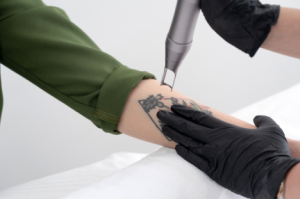Tattoos have been a form of self-expression for centuries, but as people evolve, so do their tastes. Whether it’s a name from the past, an outdated design, or a career-related decision, tattoo removal has become a sought-after solution. Fortunately, tattoo removal has come a long way–from crude, painful techniques to the advanced laser treatment today.
Early Tattoo Removal Methods: Painful and Ineffective
In the past, removing a tattoo was anything but easy. Early methods included:
- Salabrasion
Rubbing salt into the skin to scrape away ink, often leading to scarring. - Dermabrasion
A more aggressive approach, using a rotating device to remove skin layers. - Surgical Excision
cutting out the tattooed skin and stitching it back together, leaving scars. - Chemical Peels
Harsh acids used to burn off the tattooed layer of skin.
These methods were not only painful but often ineffective, leaving behind scars or remnants of the tattoo.
The Introduction of Laser Tattoo Removal

The breakthrough in tattoo removal came with laser technology in the 1960s, but the early versions were limited. The real transformation began in the 1980s and 1990s with the development of Q-switched lasers, which allowed for more precise and less invasive ink removal.
These lasers work by delivering quick pulses of energy, breaking ink particles into tiny fragments that the body naturally eliminates over time. Unlike older methods, laser removal significantly reduced scarring and improved effectiveness.
Access Additional Tattoo Removal Information Guide Here

Modern Tattoo Removal: Faster, Safer, and More Effective.
Today, tattoo removal has reached new heights with advanced laser systems such as:
- PicoSure and PicoWay Lasers
Using ultra-short pulses to remove ink more efficiently and with fewer treatments. - Different Wavelengths for Different Colors
New laser systems can target various ink colors, including stubborn blues and greens. - Less Pain, More Precision
Cooling technologies and numbing options make the process much more comfortable.
These advancements mean that tattoo removal is now safer, faster, and more effective than ever before. While complete removal still takes multiple sessions, the risk of scarring is minimal, and the results are significantly improved.
The Future of Tattoo removal
As technology advances, the future of tattoo removal looks promising. Scientists are exploring nanotechnology-based removal methods, which could potentially speed up the process even further, Additionally, ongoing improvements in laser technology continue to enhance results while reducing discomfort.
If you’re ever considered tattoo removal, now is the best time to explore your options. With cutting-edge technology, unwanted tattoos no longer have to be permanent.






